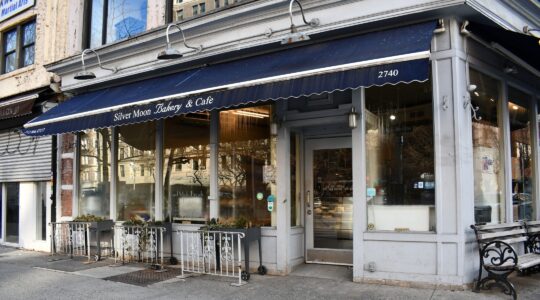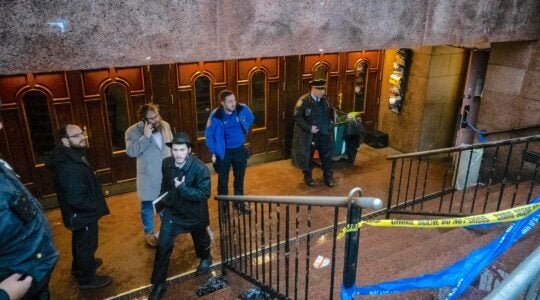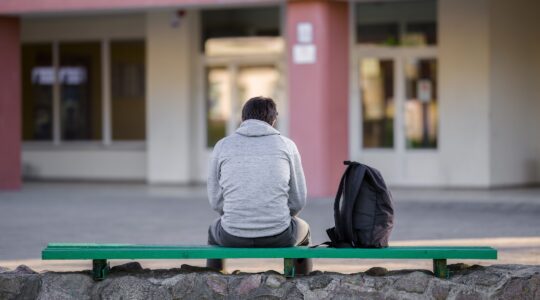The rabbi jokes that his shul is closed on Saturdays and holidays. The synagogue at Kennedy Airport opened in December and never has had a minyan. Few are flying, more are afraid.
Rabbi Bennett Rackman, JFKís Jewish chaplain, unlocks the ark where there is a Torah donated by Jewish workers from over at Customs. Two rows of cherry wood pews line the room, perpendicular to a bima, under a gently vaulted ceiling.
ìPeople come in and say how simple it is, how beautiful it is,î says the 61-year-old rabbi. ìItís serene, a place to sit and meditate.î He breathes in the quiet.
The original chapels at JFK, built in 1966, were grand affairs, the Jewish, Catholic and Protestant sanctuaries side-by-side in free-standing buildings, with conference rooms and pews enough for 250 in each. But few ever went to those chapels either.
Even Rabbi Rackman admits that in all the years heíd been traveling to Israel ó heís the son of Rabbi Emanuel Rackman, chancellor of Bar-Ilan University ó he had never bothered going to the old chapel when he had a plane to catch.
ìIt was too inconvenient,î he says. ìThis new chapel, though, is a two-minute walk from El Al.î
After the chapels were torn down in 1988, the three religions shared an interim chapel for 14 years before reopening in four small rooms on the fourth floor of Terminal Four, the International Arrivals Building. In a sign of the times, a fourth ìmultifaithî chapel has joined them, a chapel used predominantly by Muslims. (After Muslims objected to a Hindu woman walking on the Muslim prayer carpets ó in shoes, no less ó the room was partitioned to separate Muslims from Hindus, Buddhists and anyone else.)
The Jewish chapel is a project of the New York Board of Rabbis, and the airport offers free rent and utilities. The Catholic chapel is the busiest, with four weekly Masses, and a priest taking confession before each. Jews donít need a priest to pray; Jews are perfectly comfortable praying in a corner near the El Al station.
Rabbi Rackman works 12 to 15 hours a week at the airport. The empty shul has some 150 members, he says, airport workers who like the idea of the shul. They even have a shul president and vice president. The rabbi says between two and five members drop by for a weekly ìlunch and learn.î
Rabbi Rackman, also the chaplain at Peninsula Hospital in the Rockaways, would like a sign near El Al to advertise his chapel, but itís not his style to grab Jews by the lapels to help him make a minyan. He says heís there if needed, not to do outreach.
The dapper rabbi, whose BMR initials are embroidered on his cuffs and whose tie matches the hanky in his suit breast, arranges the prayerbooks from each denomination, even Lebanese and Syrian Sephard, on a shelf near the chapel door. On an easel-like stand he displays a color-faded poster commemorating the 10th anniversary of Jerusalemís reunification in 1977.
ìA guy came along one afternoon, saying he wanted to put on tallis and tefillin,î the chaplain recalls. ìI said you have to wait, thereís a woman in there davening Mincha. I want to get a portable mechitza thatís easy to set up and take down.î
The stray traveler does come by. Rabbi Rackman recalls a woman who had a flight the next day.
ìShe didnít have a place to stay, a place to eat, nothing to do,î he says. ìI told her she could rest in the chapel.î
Another time, a traveler wanted to talk about intermarriage.
It is quiet. The chaplain waits. He will work hard when death comes crashing out of the sky onto a beach, or into the street, as a plane did in 2001 in Belle Harbor, just blocks from his home. Suddenly he had a congregation of rescue workers and mourners.
In July, two weeks after he started working at JFK, they dedicated a memorial in Suffolk County to TWA Flight 800, which exploded in the skies in 1996, killing 230.
ìThe relatives banded together to give each other support, demonstrating what to do in a crisis,î Rabbi Rackman says. ìYou donít fall apart. You give each other comfort and strength.î
The rabbi paused in the slow afternoon. ìAnyone getting on a plane today is worried. People are scared. I have to be available for them,î he says, adding that he would like to counsel people traveling to Israel but the situation has yet to arise. ìAwful things happen in this world for which I have no explanation. But thereís a God. We are partners with God to finish his work.î
On this day, no families need answers. The terror alert was orange, but no one was looking for the rabbi.
In the chapel, on the good days, there is no minyan. n
The New York Jewish Week brings you the stories behind the headlines, keeping you connected to Jewish life in New York. Help sustain the reporting you trust by donating today.




